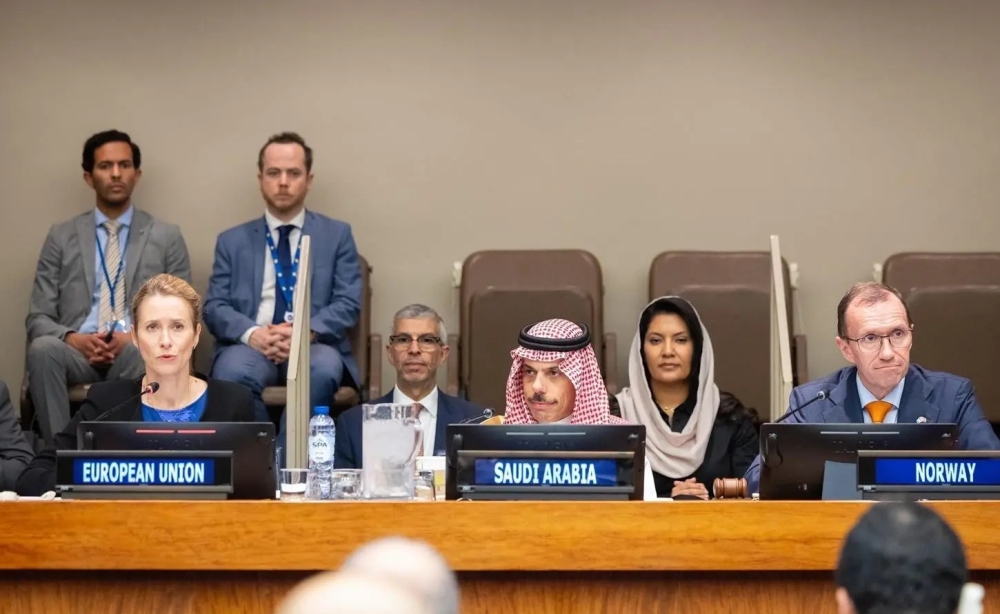Yesterday evening, His Royal Highness Prince Faisal bin Farhan bin Abdullah, the Minister of Foreign Affairs, co-chaired, in partnership with the European Union and the Kingdom of Norway, the high-level ministerial meeting of the International Alliance for Implementing the Two-State Solution. The meeting was held on the sidelines of the 80th session of the United Nations General Assembly.
He opened the meeting by stating: “We meet today, one year after launching our joint initiative (the International Alliance for Implementing the Two-State Solution), which the Kingdom is honored to co-chair in partnership with the European Union and the Kingdom of Norway, and days after the General Assembly’s adoption of the New York Declaration, which represents a historic international consensus on ending the occupation and realizing an independent Palestinian state.”
He referred to the New York Declaration as a clear mandate for everyone to turn consensus into time-bound commitments and follow-up mechanisms, saying: “Issuing statements is not enough unless they translate into real action that changes the reality of the occupation and its aggression.”
Widespread Recognition of the State of Palestine
The Foreign Minister added in his speech that the meeting follows the Peace Summit co-chaired by the Kingdom and France, which resulted in widespread recognition of the State of Palestine, strengthening the international will to entrench the right of the Palestinian people to self-determination. He stressed that “the reality of the occupation continues to persist in extermination, famine, and violations against Islamic and Christian holy sites, and has even reached attacks on the sovereignty of Arab states, the latest of which was the targeting of the State of Qatar.”
He indicated that the goal of the meeting is to coordinate efforts and establish implementation mechanisms, progress indicators, and clear accountability, while continuing joint work in regional and international capitals.
He mentioned that the New York Declaration affirms “that Gaza and the West Bank, including East Jerusalem, are one indivisible Palestinian land,” emphasizing the absolute rejection of any annexation attempts, settlement expansion, or forced displacement, and the necessity of empowering the Palestinian Authority and supporting the Arab-Islamic plan for recovery and reconstruction, and establishing an international accountability mechanism within clear timelines.
Significant Efforts by the Kingdom
The Foreign Minister affirmed that the Kingdom will continue to tirelessly lead its diplomatic and humanitarian efforts to realize an independent Palestinian state on the 1967 borders with East Jerusalem as its capital, paving the way for a just and lasting peace, shared security, and prosperity for all the peoples of the region.
United Nations General Assembly
The United Nations General Assembly is the main deliberative, policymaking, and representative organ of the United Nations, established in 1945 after World War II. It provides a unique forum for multilateral discussion of international issues, including peace, security, and development, where all 193 Member States have equal representation. Its annual general debate, held at the Headquarters in New York City, is a prominent event where world leaders gather to address the global community.
International Alliance for Implementing the Two-State Solution
The “International Alliance for Implementing the Two-State Solution” is not a physical place or a long-standing cultural site, but a diplomatic initiative. It was launched in 2024 by several Arab and European nations to revitalize efforts towards a peaceful resolution of the Israeli-Palestinian conflict. The alliance aims to provide a practical pathway for establishing an independent Palestinian state alongside Israel.
New York Declaration
The “New York Declaration” is not a physical place or cultural site, but a significant international agreement. It was adopted by the United Nations General Assembly in 2016 as a response to the global refugee crisis. The declaration aimed to strengthen the protection of refugees and migrants and led to the creation of the Global Compact on Refugees.
Peace Summit
I am unable to provide a specific summary for “Peace Summit” as it is not a single, well-defined place or cultural site. The term generally refers to a high-level meeting between leaders to discuss conflict resolution. For a summary, a specific summit (e.g., the Camp David Accords) or a dedicated memorial site would be needed.
State of Palestine
The State of Palestine is a partially recognized sovereign state in the Middle East, located in the West Bank and the Gaza Strip. Its history is deeply intertwined with the Israeli-Palestinian conflict, stemming from the 1948 Arab-Israeli War and the subsequent Israeli occupation of these territories following the 1967 Six-Day War. The Palestinian Declaration of Independence in 1988 proclaimed the state, which is today recognized by a majority of UN member states.
Islamic holy sites
Islamic holy sites are sacred locations central to the faith, with the most significant being the Masjid al-Haram in Mecca, home to the Kaaba, which Muslims believe was built by Abraham and his son Ishmael. The Prophet’s Mosque in Medina, the burial place of Muhammad, is another paramount site, while the Al-Aqsa Mosque compound in Jerusalem is revered as the location of the Prophet’s night journey. These sites are the focal points for the Hajj and Umrah pilgrimages, drawing millions of worshippers annually.
Christian holy sites
Christian holy sites are locations of profound religious significance, primarily in the Holy Land, associated with the life, ministry, death, and resurrection of Jesus Christ. Key sites include the Church of the Holy Sepulchre in Jerusalem, traditionally believed to encompass both Calvary and Christ’s tomb, and the Church of the Nativity in Bethlehem, built over the grotto revered as his birthplace. These destinations have been major pilgrimage centers for centuries and have complex histories of construction, destruction, and veneration by various Christian denominations.
Palestinian Authority
The Palestinian Authority is a self-governing administrative body established in 1994 as part of the Oslo Accords, with the purpose of governing parts of the West Bank and the Gaza Strip. It was created as an interim institution to oversee civil affairs and internal security for a five-year period leading to a final status agreement with Israel. While its governance has been marked by political division and ongoing conflict, it remains the primary administrative organization for Palestinian populations in the occupied territories.






